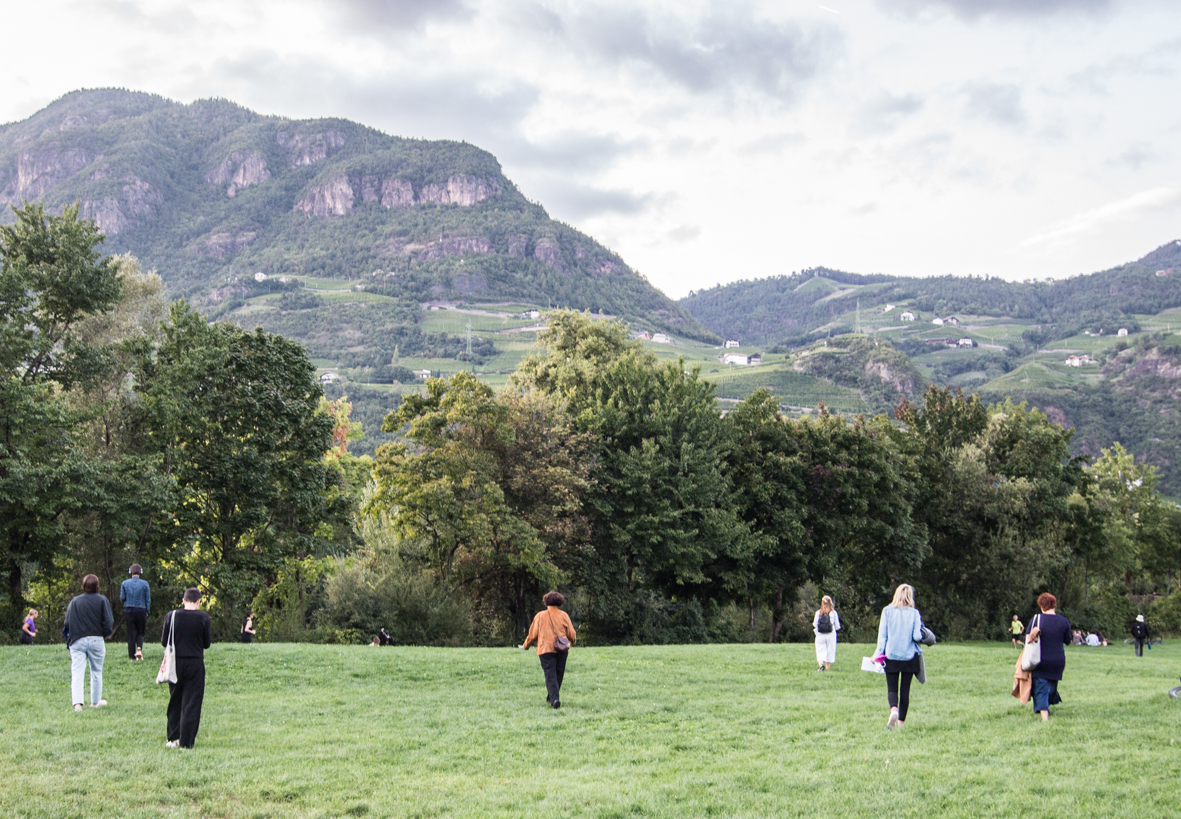01.12.2021, 17:00 – 19:00 Uhr
Treffpunkt: ar/ge kunst und online
Anmeldung: info@argekunst.it
Sprache: engl
lesen, hören, gehen, fließen, reden
Wir laden Euch am 01.Dezember um 17 Uhr zur letzten Reading Rivers Session für dieses Jahr im Rahmen von Soil Times, in die ar/ge kunst ein. Die Teilnahme ist in Präsenz und online möglich.
Reading Rivers #4 vertieft die Ausstellung Plant Plant (27.11.21 – 12.02.22) in der ar/ge kunst und die künstlerische Praxis von der in Wien lebenden Künstlerin Katrin Hornek, die sich in ihrer Arbeit stets für ein komplexeres Verständnis von Natur und Kultur einsetzt.
Nach einer Einführung zur Ausstellung durch die Kuratorinnen, gibt es einen 40minütigen Podcast mit ausgewählten Texten von Autor*innen wie Rosi Braidotti und Jan Willem Erisman, welche sich mit der Interrelation von Fruchtbarkeit des Bodens und des Menschens befassen und über den Zusammenhang von Reproduktion und Produktivität sprechen.
Den Podcast hören sich die Teilnehmer*innen an einem Fluss anhören. Dies kann die Talfer, Themse, Navigli, Spree oder der Fluß in deiner Nähe sein.
Texte haben wie das Wasser eines Flusses einen klaren Ursprung, vereinen sich durch die kollektive Lektüre immer wieder mit Neuem, um in etwas Größeres zu fließen. Sie durchqueren verschiedene Landschaften, Zeiten, Charaktere. Stoßen auf Hindernisse und fließen dort vorbei, wo es weniger Widerstand gibt. Das fließende Wasser des Flusses wird dem Wissen gleichgestellt, das zwar mit Fixpunkten verbunden ist, aber auch in ständiger Bewegung bleibt, um so komplexe Fragen der Gegenwart neu zu lesen.
Wie beeinflussen uns die Bewegungen des Körpers und Wassers beim Zuhören und Lesen von Texten und Landschaft? Ein fließender Gedankenaustausch zu Inhalt und Erlebnis schließt die zweistündige Reading Rivers Session ab.
Teilnahme in Präsenz nur mit Green Pass.
Bibliography Reading Rivers #4
Nick Axel, Cooking Sections and Nikolaus Hirsch: Exhausted in e-flux Architecture, April 2021.
Jan Willem Erisman, Mark A. Sutton, James Galloway, Zbigniew Klimon and Wilfried Winiwarter, How a century of ammonia synthesis changed the world, Nature Geoscience 1, no. 10 (2008), pp. 636-639.
Rosi Braidotti, The Posthuman, Cambridge:Polity Press, 2013, pp. 47-50.
Podcast Soil Times Credits
Stimmen: Simone Mair, Fiona Johnson, Sheila Romen, James Lewis
Editing: Daniel Mazza
01.12.2021, 17:00 – 19:00
Meeting point: ar/ge kunst and online
Registration: info@argekunst.it
Language: engl
reading, listening, walking, flowing, speaking
You are invited to join us for the final Reading Rivers session of the year in the context of Soil Times at ar/ge kunst, at 5 pm on 1 December. This event can be attended in presence or online.
Reading Rivers #4 will take a deeper look at the exhibition Plant Plant at ar/ge kunst (27.11.21 – 12.02.22), and at the artistic practice of Vienna based artist Katrin Hornek, who always advocates a more complex conception of nature and culture in her work.
Following an introduction to the exhibition from the curators there will be a forty-minute podcast with readings from selected texts by authors such as Rosi Braidotti and Jan Willem Erisman, who deal with the relationship between soil fertility and human fertility and speak about the connections between reproduction and productivity. Participants will listen to the podcast from the banks of a river. This might be the Talvera, the Thames, the Navigli, the Spree or the river close to you.
Like water in a river, texts have a clear source. Through acts of collective reading they come into contact and combine with new things before flowing together into a greater whole. They cross different landscapes, periods, characters. They come up against obstacles and find the paths of least resistance around them. The flowing water of a river is comparable to knowledge; it is bound up with solid ground but remains in a permanent state of flux, allowing new readings of complex contemporary questions.
How are we influenced by the dynamics of our bodies and the movement of water when we read and listen to texts and landscapes? This two-hour Reading Rivers session will close with a free-flowing exchange of ideas on the substance and experience of the event.
Participation in presence with Green Pass only.
Bibliography Reading Rivers #4
Nick Axel, Cooking Sections and Nikolaus Hirsch: Exhausted in e-flux Architecture, April 2021.
Jan Willem Erisman, Mark A. Sutton, James Galloway, Zbigniew Klimon and Wilfried Winiwarter, How a century of ammonia synthesis changed the world, Nature Geoscience 1, no. 10 (2008), pp. 636-639.
Rosi Braidotti, The Posthuman, Cambridge:Polity Press, 2013, pp. 47-50.
Podcast Soil Times Credits
Voices: Simone Mair, Fiona Johnson, Sheila Romen, James Lewis
Editing: Daniel Mazza
01.12.2021, ore 17:00 – 19:00
Punto d‘incontro: ar/ge kunst e online
Registrazione: info@argekunst.it
Lingue: engl
leggere, ascoltare, camminare, scorrere, parlare
Siete invitat* all’ultima sessione annuale di Reading Rivers, nell’ambito del programma pubblico di Soil Times di ar/ge kunst. Un’edizione, in presenza e online che si terrà il 1° dicembre alle ore 17.
Reading Rivers #4 approfondisce la mostra Plant Plant (27.11.21 – 12.02.22) ad ar/ge kunst e la pratica artistica dell’artista viennese Katrin Hornek che persegue una comprensione complessa di natura e cultura.
Dopo un’introduzione alla mostra da parte delle curatrici, i partecipant* ascolteranno un podcast di 40 minuti con testi selezionati di autori come Rosi Braidotti e Jan Willem Erisman, che si occupano dell’interrelazione tra la fertilità del suolo e l’uomo e parlano della connessione tra riproduzione e produttività.
I partecipant* sono invitati all’ascolto del podcast nei pressi di un fiume, qualunque esso sia: il Talvera, il Tamigi, i Navigli, la Sprea o il fiume a te più vicino.
Come l’acqua di un fiume, i testi hanno un’origine chiara; attraverso la lettura collettiva entrano in contatto e si uniscono a elementi nuovi prima di continuare a fluire in qualcosa di più grande. Attraversano diversi paesaggi, tempi, personaggi. Incontrano ostacoli e li aggirano trovando percorsi dove c’è meno resistenza. Lo scorrere delle acque del fiume è come la conoscenza: ancorata a punti stabili, rimane comunque in costante movimento, permettendo nuove letture delle complesse questioni del presente.
In che modo i movimenti del corpo e dell’acqua ci influenzano quando ascoltiamo e leggiamo testi e paesaggi? Un fluido scambio di idee su contenuti ed esperienze conclude le due ore di sessione di Reading Rivers.
Partecipazione in presenza solo con Green Pass
Bibliography Reading Rivers #4
Nick Axel, Cooking Sections and Nikolaus Hirsch: Exhausted in e-flux Architecture, April 2021.
Jan Willem Erisman, Mark A. Sutton, James Galloway, Zbigniew Klimon and Wilfried Winiwarter, How a century of ammonia synthesis changed the world, Nature Geoscience 1, no. 10 (2008), pp. 636-639.
Rosi Braidotti, The Posthuman, Cambridge:Polity Press, 2013, pp. 47-50.
Podcast Soil Times Credits
Voci: Simone Mair, Fiona Johnson, Sheila Romen, James Lewis
Editing: Daniel Mazza



